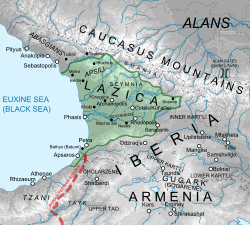| Lazic War | |||||||||
|---|---|---|---|---|---|---|---|---|---|
| Part of the Byzantine-Sasanian Wars | |||||||||
 Map of Lazica | |||||||||
| |||||||||
| Belligerents | |||||||||
| |||||||||
| Commanders and leaders | |||||||||
|
Justinian I John Tzibus † Dagisthaeus Bessas Martin Valerian Bouzes Belisarius Justin Gubazes II of Lazica (after 548) Dabragezas Elmingir |
Khosrow I Mihr-Mihroe Nachoragan Nabedes Farroxan[2] Izadgushasp Fariburz Gubazes II of Lazica (541–548) Opsites of Lazica Terdetes[3] | ||||||||
The Lazic War, also known as the Colchidian War or in Georgian historiography as the Great War of Egrisi,[4] was fought between the Byzantine Empire and the Sasanian Empire for control of the ancient Georgian region of Lazica. The Lazic War lasted for twenty years, from 541 to 562, and ended with the Fifty-Year Peace Treaty, which obligated the Byzantine Empire to pay tribute to Persia each year for the recognition of Lazica as a Byzantine vassal state by Persians. The Lazic War is narrated in detail in the works of Procopius and Agathias.[5]
- ^ The Persian Empire: A Historical Encyclopedia (2 volumes): A Historical... Archived 28 March 2018 at the Wayback Machine. "When the war finally ended the Persian Sasanians had triumphed, forcing the Byzantine emperor to pay 400 pounds of gold annually."
- ^ Alemany 2003, p. 5.
- ^ Procopius of Caesarea (2016). Delphi Complete Works of Procopius (Illustrated). Delphi Classics. ISBN 978-1-78656-373-6.
- ^ Georgian: ეგრისის დიდი ომი Egrisis Didi Omi
- ^ Leppin, Hartmut (2021). "The Eastern Roman Empire and Its Neighbours in the "Age of Justinian" – An Overview". In Meier, Mischa; Montinaro, Federico (eds.). A Companion to Procopius of Caesarea. Leiden, The Netherlands: Brill. p. 13. ISBN 978-90-04-49877-8.
After 545 truces brought peace to most of the border regions, but the war lingered in the Caucasus until 561, when Khosrow and Justinian finally agreed to a fifty-year peace. There was no definite victor, but the Sasanian Empire was in a slightly better position as Rome was obliged to pay a fixed sum to Persia each year.